A Critical Discussion on Genuine Agreement in Modern Contract Law
VerifiedAdded on 2024/06/27
|10
|3544
|156
Essay
AI Summary
This essay critically discusses the concept of 'genuine agreement' in contract law, examining whether the idea of both parties fully understanding their rights and liabilities holds true in practice. It explains that a genuine agreement requires consent free from misrepresentation, undue influence, fraud, duress, or mistake, and that a non-genuine contract is voidable. The essay details the rights and duties of parties in a contract, including the duty to indemnify, the right to rescind, the duty of performance, the right to be paid, and the right to good faith. Landmark cases like Central London Property Trust Ltd v High Trees House Ltd and Carlill v Carbolic Smoke Ball Company are analyzed to illustrate the establishment of rights and liabilities. Furthermore, the essay explains and critically analyses the operation of the Rule in Robinson v. Harman, highlighting the measure and purpose of compensatory damages for breach of contract. The conclusion emphasizes the necessity of genuine agreement, free from coercion and undue influence, with clearly established rights and obligations for all parties involved. Desklib provides access to this and other solved assignments to aid students in their studies.
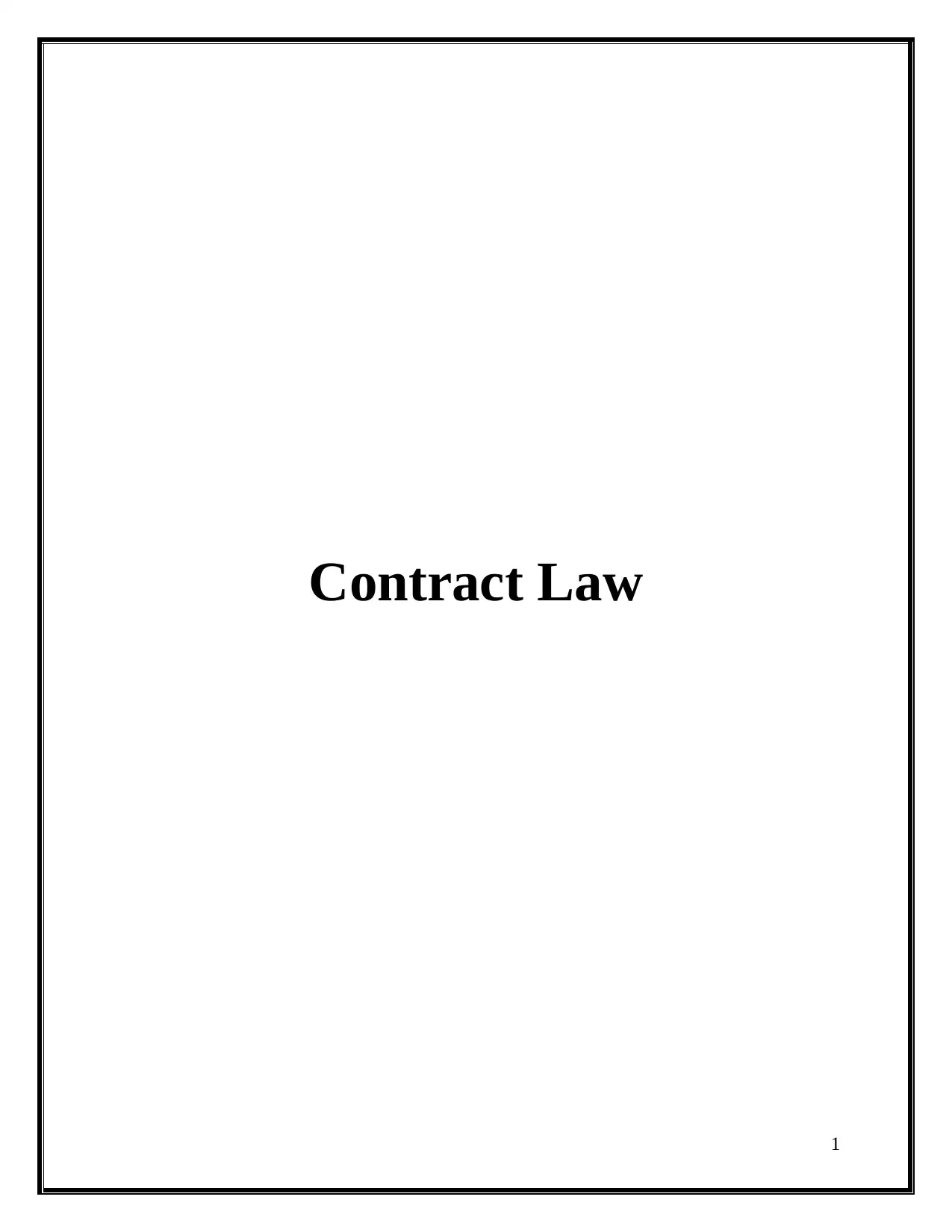
Contract Law
1
1
Paraphrase This Document
Need a fresh take? Get an instant paraphrase of this document with our AI Paraphraser
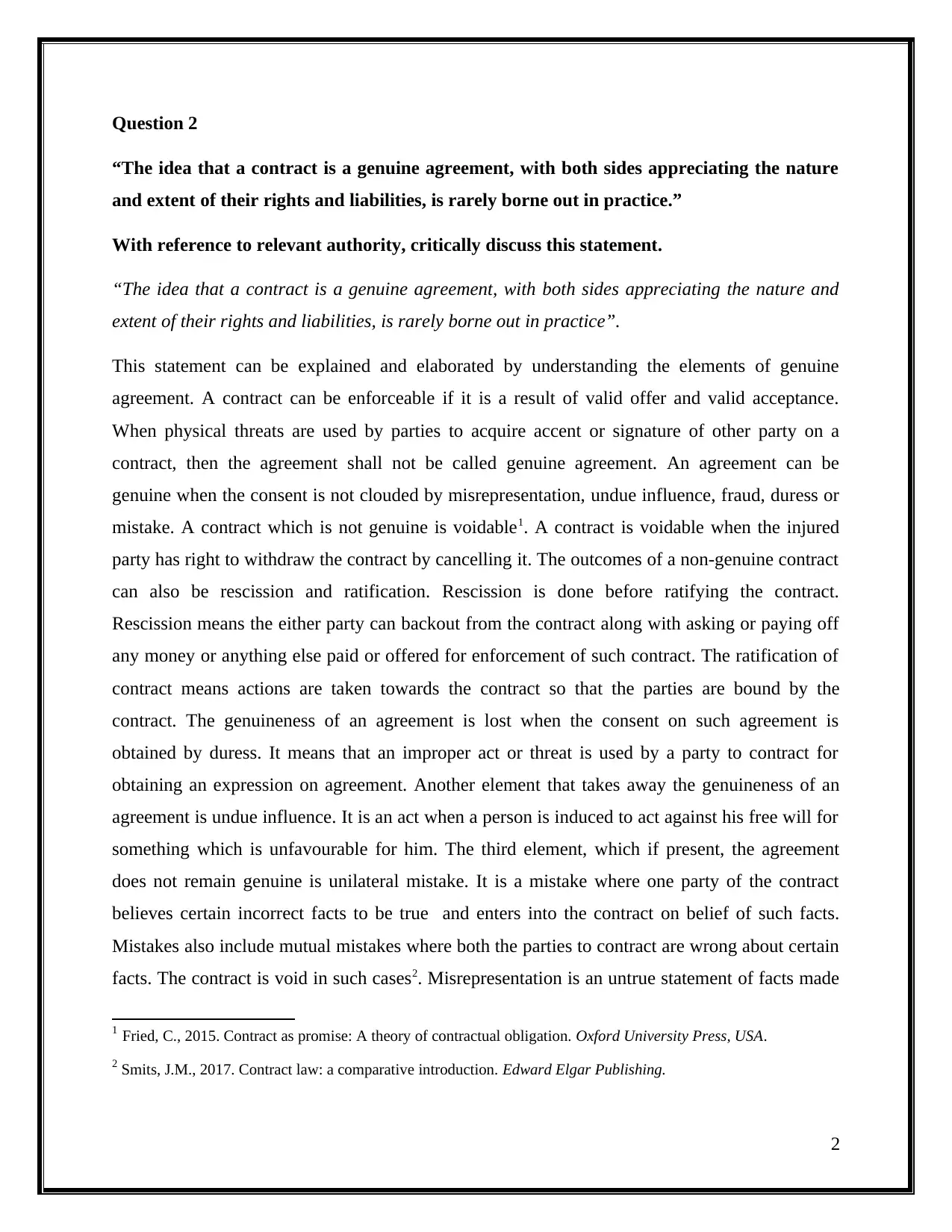
Question 2
“The idea that a contract is a genuine agreement, with both sides appreciating the nature
and extent of their rights and liabilities, is rarely borne out in practice.”
With reference to relevant authority, critically discuss this statement.
“The idea that a contract is a genuine agreement, with both sides appreciating the nature and
extent of their rights and liabilities, is rarely borne out in practice”.
This statement can be explained and elaborated by understanding the elements of genuine
agreement. A contract can be enforceable if it is a result of valid offer and valid acceptance.
When physical threats are used by parties to acquire accent or signature of other party on a
contract, then the agreement shall not be called genuine agreement. An agreement can be
genuine when the consent is not clouded by misrepresentation, undue influence, fraud, duress or
mistake. A contract which is not genuine is voidable1. A contract is voidable when the injured
party has right to withdraw the contract by cancelling it. The outcomes of a non-genuine contract
can also be rescission and ratification. Rescission is done before ratifying the contract.
Rescission means the either party can backout from the contract along with asking or paying off
any money or anything else paid or offered for enforcement of such contract. The ratification of
contract means actions are taken towards the contract so that the parties are bound by the
contract. The genuineness of an agreement is lost when the consent on such agreement is
obtained by duress. It means that an improper act or threat is used by a party to contract for
obtaining an expression on agreement. Another element that takes away the genuineness of an
agreement is undue influence. It is an act when a person is induced to act against his free will for
something which is unfavourable for him. The third element, which if present, the agreement
does not remain genuine is unilateral mistake. It is a mistake where one party of the contract
believes certain incorrect facts to be true and enters into the contract on belief of such facts.
Mistakes also include mutual mistakes where both the parties to contract are wrong about certain
facts. The contract is void in such cases2. Misrepresentation is an untrue statement of facts made
1 Fried, C., 2015. Contract as promise: A theory of contractual obligation. Oxford University Press, USA.
2 Smits, J.M., 2017. Contract law: a comparative introduction. Edward Elgar Publishing.
2
“The idea that a contract is a genuine agreement, with both sides appreciating the nature
and extent of their rights and liabilities, is rarely borne out in practice.”
With reference to relevant authority, critically discuss this statement.
“The idea that a contract is a genuine agreement, with both sides appreciating the nature and
extent of their rights and liabilities, is rarely borne out in practice”.
This statement can be explained and elaborated by understanding the elements of genuine
agreement. A contract can be enforceable if it is a result of valid offer and valid acceptance.
When physical threats are used by parties to acquire accent or signature of other party on a
contract, then the agreement shall not be called genuine agreement. An agreement can be
genuine when the consent is not clouded by misrepresentation, undue influence, fraud, duress or
mistake. A contract which is not genuine is voidable1. A contract is voidable when the injured
party has right to withdraw the contract by cancelling it. The outcomes of a non-genuine contract
can also be rescission and ratification. Rescission is done before ratifying the contract.
Rescission means the either party can backout from the contract along with asking or paying off
any money or anything else paid or offered for enforcement of such contract. The ratification of
contract means actions are taken towards the contract so that the parties are bound by the
contract. The genuineness of an agreement is lost when the consent on such agreement is
obtained by duress. It means that an improper act or threat is used by a party to contract for
obtaining an expression on agreement. Another element that takes away the genuineness of an
agreement is undue influence. It is an act when a person is induced to act against his free will for
something which is unfavourable for him. The third element, which if present, the agreement
does not remain genuine is unilateral mistake. It is a mistake where one party of the contract
believes certain incorrect facts to be true and enters into the contract on belief of such facts.
Mistakes also include mutual mistakes where both the parties to contract are wrong about certain
facts. The contract is void in such cases2. Misrepresentation is an untrue statement of facts made
1 Fried, C., 2015. Contract as promise: A theory of contractual obligation. Oxford University Press, USA.
2 Smits, J.M., 2017. Contract law: a comparative introduction. Edward Elgar Publishing.
2
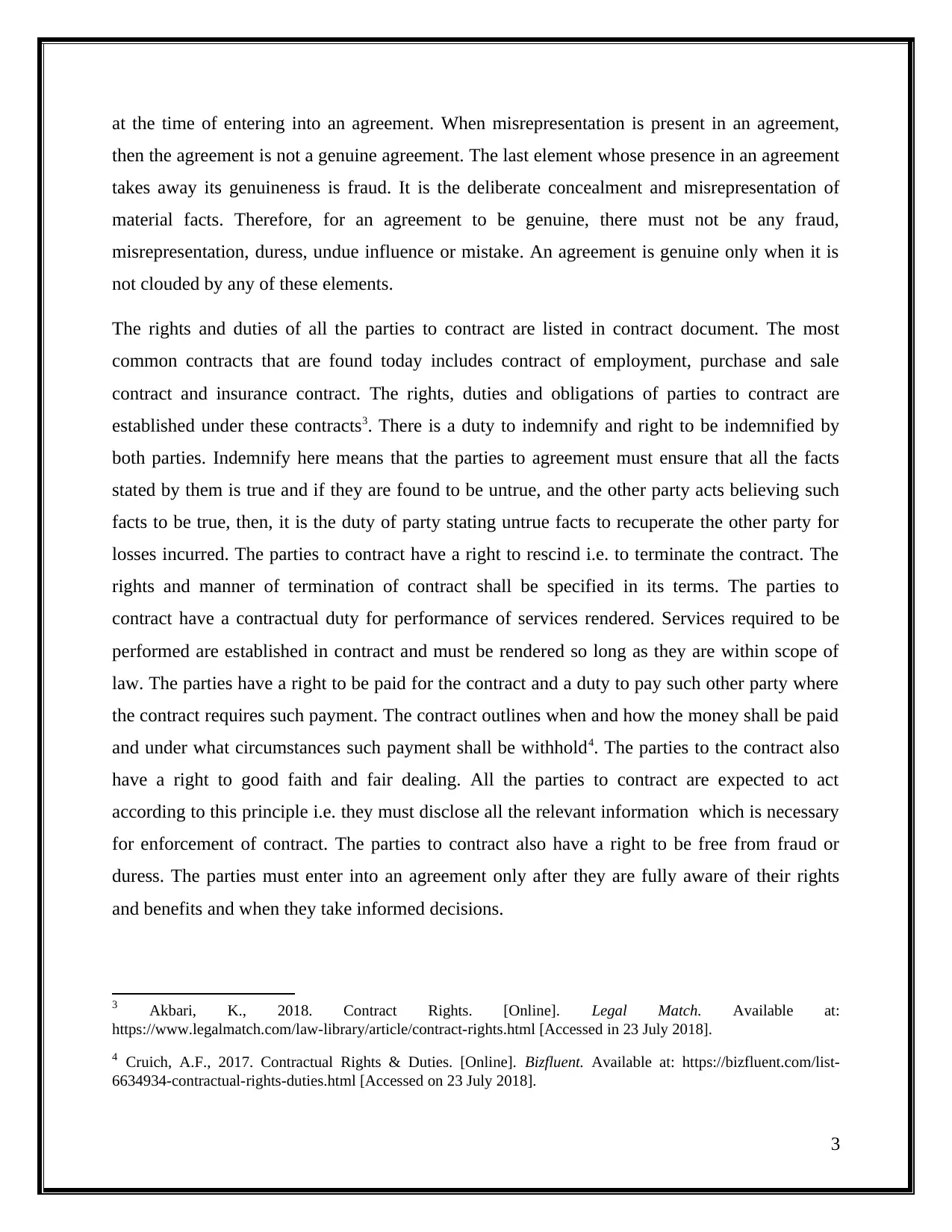
at the time of entering into an agreement. When misrepresentation is present in an agreement,
then the agreement is not a genuine agreement. The last element whose presence in an agreement
takes away its genuineness is fraud. It is the deliberate concealment and misrepresentation of
material facts. Therefore, for an agreement to be genuine, there must not be any fraud,
misrepresentation, duress, undue influence or mistake. An agreement is genuine only when it is
not clouded by any of these elements.
The rights and duties of all the parties to contract are listed in contract document. The most
common contracts that are found today includes contract of employment, purchase and sale
contract and insurance contract. The rights, duties and obligations of parties to contract are
established under these contracts3. There is a duty to indemnify and right to be indemnified by
both parties. Indemnify here means that the parties to agreement must ensure that all the facts
stated by them is true and if they are found to be untrue, and the other party acts believing such
facts to be true, then, it is the duty of party stating untrue facts to recuperate the other party for
losses incurred. The parties to contract have a right to rescind i.e. to terminate the contract. The
rights and manner of termination of contract shall be specified in its terms. The parties to
contract have a contractual duty for performance of services rendered. Services required to be
performed are established in contract and must be rendered so long as they are within scope of
law. The parties have a right to be paid for the contract and a duty to pay such other party where
the contract requires such payment. The contract outlines when and how the money shall be paid
and under what circumstances such payment shall be withhold4. The parties to the contract also
have a right to good faith and fair dealing. All the parties to contract are expected to act
according to this principle i.e. they must disclose all the relevant information which is necessary
for enforcement of contract. The parties to contract also have a right to be free from fraud or
duress. The parties must enter into an agreement only after they are fully aware of their rights
and benefits and when they take informed decisions.
3 Akbari, K., 2018. Contract Rights. [Online]. Legal Match. Available at:
https://www.legalmatch.com/law-library/article/contract-rights.html [Accessed in 23 July 2018].
4 Cruich, A.F., 2017. Contractual Rights & Duties. [Online]. Bizfluent. Available at: https://bizfluent.com/list-
6634934-contractual-rights-duties.html [Accessed on 23 July 2018].
3
then the agreement is not a genuine agreement. The last element whose presence in an agreement
takes away its genuineness is fraud. It is the deliberate concealment and misrepresentation of
material facts. Therefore, for an agreement to be genuine, there must not be any fraud,
misrepresentation, duress, undue influence or mistake. An agreement is genuine only when it is
not clouded by any of these elements.
The rights and duties of all the parties to contract are listed in contract document. The most
common contracts that are found today includes contract of employment, purchase and sale
contract and insurance contract. The rights, duties and obligations of parties to contract are
established under these contracts3. There is a duty to indemnify and right to be indemnified by
both parties. Indemnify here means that the parties to agreement must ensure that all the facts
stated by them is true and if they are found to be untrue, and the other party acts believing such
facts to be true, then, it is the duty of party stating untrue facts to recuperate the other party for
losses incurred. The parties to contract have a right to rescind i.e. to terminate the contract. The
rights and manner of termination of contract shall be specified in its terms. The parties to
contract have a contractual duty for performance of services rendered. Services required to be
performed are established in contract and must be rendered so long as they are within scope of
law. The parties have a right to be paid for the contract and a duty to pay such other party where
the contract requires such payment. The contract outlines when and how the money shall be paid
and under what circumstances such payment shall be withhold4. The parties to the contract also
have a right to good faith and fair dealing. All the parties to contract are expected to act
according to this principle i.e. they must disclose all the relevant information which is necessary
for enforcement of contract. The parties to contract also have a right to be free from fraud or
duress. The parties must enter into an agreement only after they are fully aware of their rights
and benefits and when they take informed decisions.
3 Akbari, K., 2018. Contract Rights. [Online]. Legal Match. Available at:
https://www.legalmatch.com/law-library/article/contract-rights.html [Accessed in 23 July 2018].
4 Cruich, A.F., 2017. Contractual Rights & Duties. [Online]. Bizfluent. Available at: https://bizfluent.com/list-
6634934-contractual-rights-duties.html [Accessed on 23 July 2018].
3
⊘ This is a preview!⊘
Do you want full access?
Subscribe today to unlock all pages.

Trusted by 1+ million students worldwide
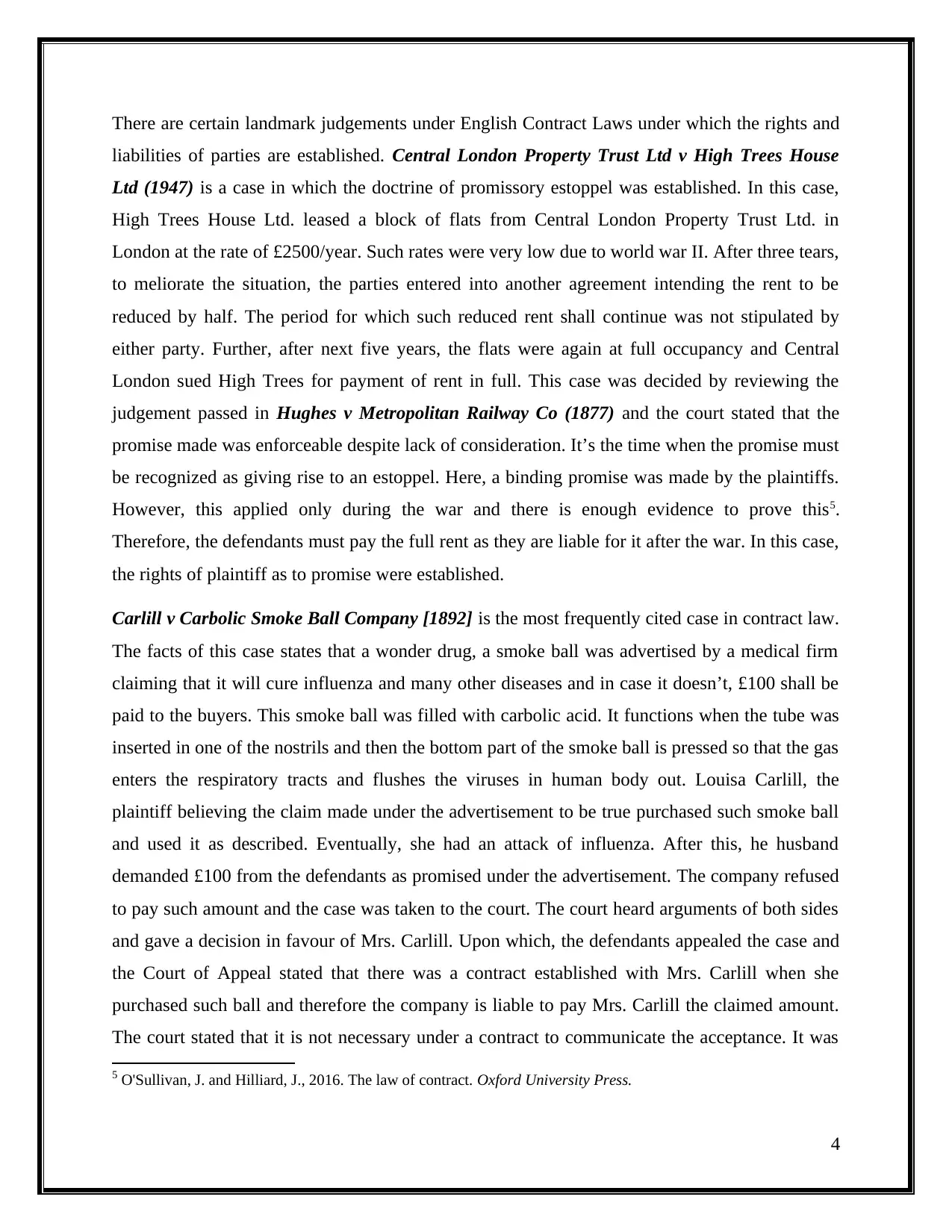
There are certain landmark judgements under English Contract Laws under which the rights and
liabilities of parties are established. Central London Property Trust Ltd v High Trees House
Ltd (1947) is a case in which the doctrine of promissory estoppel was established. In this case,
High Trees House Ltd. leased a block of flats from Central London Property Trust Ltd. in
London at the rate of £2500/year. Such rates were very low due to world war II. After three tears,
to meliorate the situation, the parties entered into another agreement intending the rent to be
reduced by half. The period for which such reduced rent shall continue was not stipulated by
either party. Further, after next five years, the flats were again at full occupancy and Central
London sued High Trees for payment of rent in full. This case was decided by reviewing the
judgement passed in Hughes v Metropolitan Railway Co (1877) and the court stated that the
promise made was enforceable despite lack of consideration. It’s the time when the promise must
be recognized as giving rise to an estoppel. Here, a binding promise was made by the plaintiffs.
However, this applied only during the war and there is enough evidence to prove this5.
Therefore, the defendants must pay the full rent as they are liable for it after the war. In this case,
the rights of plaintiff as to promise were established.
Carlill v Carbolic Smoke Ball Company [1892] is the most frequently cited case in contract law.
The facts of this case states that a wonder drug, a smoke ball was advertised by a medical firm
claiming that it will cure influenza and many other diseases and in case it doesn’t, £100 shall be
paid to the buyers. This smoke ball was filled with carbolic acid. It functions when the tube was
inserted in one of the nostrils and then the bottom part of the smoke ball is pressed so that the gas
enters the respiratory tracts and flushes the viruses in human body out. Louisa Carlill, the
plaintiff believing the claim made under the advertisement to be true purchased such smoke ball
and used it as described. Eventually, she had an attack of influenza. After this, he husband
demanded £100 from the defendants as promised under the advertisement. The company refused
to pay such amount and the case was taken to the court. The court heard arguments of both sides
and gave a decision in favour of Mrs. Carlill. Upon which, the defendants appealed the case and
the Court of Appeal stated that there was a contract established with Mrs. Carlill when she
purchased such ball and therefore the company is liable to pay Mrs. Carlill the claimed amount.
The court stated that it is not necessary under a contract to communicate the acceptance. It was
5 O'Sullivan, J. and Hilliard, J., 2016. The law of contract. Oxford University Press.
4
liabilities of parties are established. Central London Property Trust Ltd v High Trees House
Ltd (1947) is a case in which the doctrine of promissory estoppel was established. In this case,
High Trees House Ltd. leased a block of flats from Central London Property Trust Ltd. in
London at the rate of £2500/year. Such rates were very low due to world war II. After three tears,
to meliorate the situation, the parties entered into another agreement intending the rent to be
reduced by half. The period for which such reduced rent shall continue was not stipulated by
either party. Further, after next five years, the flats were again at full occupancy and Central
London sued High Trees for payment of rent in full. This case was decided by reviewing the
judgement passed in Hughes v Metropolitan Railway Co (1877) and the court stated that the
promise made was enforceable despite lack of consideration. It’s the time when the promise must
be recognized as giving rise to an estoppel. Here, a binding promise was made by the plaintiffs.
However, this applied only during the war and there is enough evidence to prove this5.
Therefore, the defendants must pay the full rent as they are liable for it after the war. In this case,
the rights of plaintiff as to promise were established.
Carlill v Carbolic Smoke Ball Company [1892] is the most frequently cited case in contract law.
The facts of this case states that a wonder drug, a smoke ball was advertised by a medical firm
claiming that it will cure influenza and many other diseases and in case it doesn’t, £100 shall be
paid to the buyers. This smoke ball was filled with carbolic acid. It functions when the tube was
inserted in one of the nostrils and then the bottom part of the smoke ball is pressed so that the gas
enters the respiratory tracts and flushes the viruses in human body out. Louisa Carlill, the
plaintiff believing the claim made under the advertisement to be true purchased such smoke ball
and used it as described. Eventually, she had an attack of influenza. After this, he husband
demanded £100 from the defendants as promised under the advertisement. The company refused
to pay such amount and the case was taken to the court. The court heard arguments of both sides
and gave a decision in favour of Mrs. Carlill. Upon which, the defendants appealed the case and
the Court of Appeal stated that there was a contract established with Mrs. Carlill when she
purchased such ball and therefore the company is liable to pay Mrs. Carlill the claimed amount.
The court stated that it is not necessary under a contract to communicate the acceptance. It was
5 O'Sullivan, J. and Hilliard, J., 2016. The law of contract. Oxford University Press.
4
Paraphrase This Document
Need a fresh take? Get an instant paraphrase of this document with our AI Paraphraser
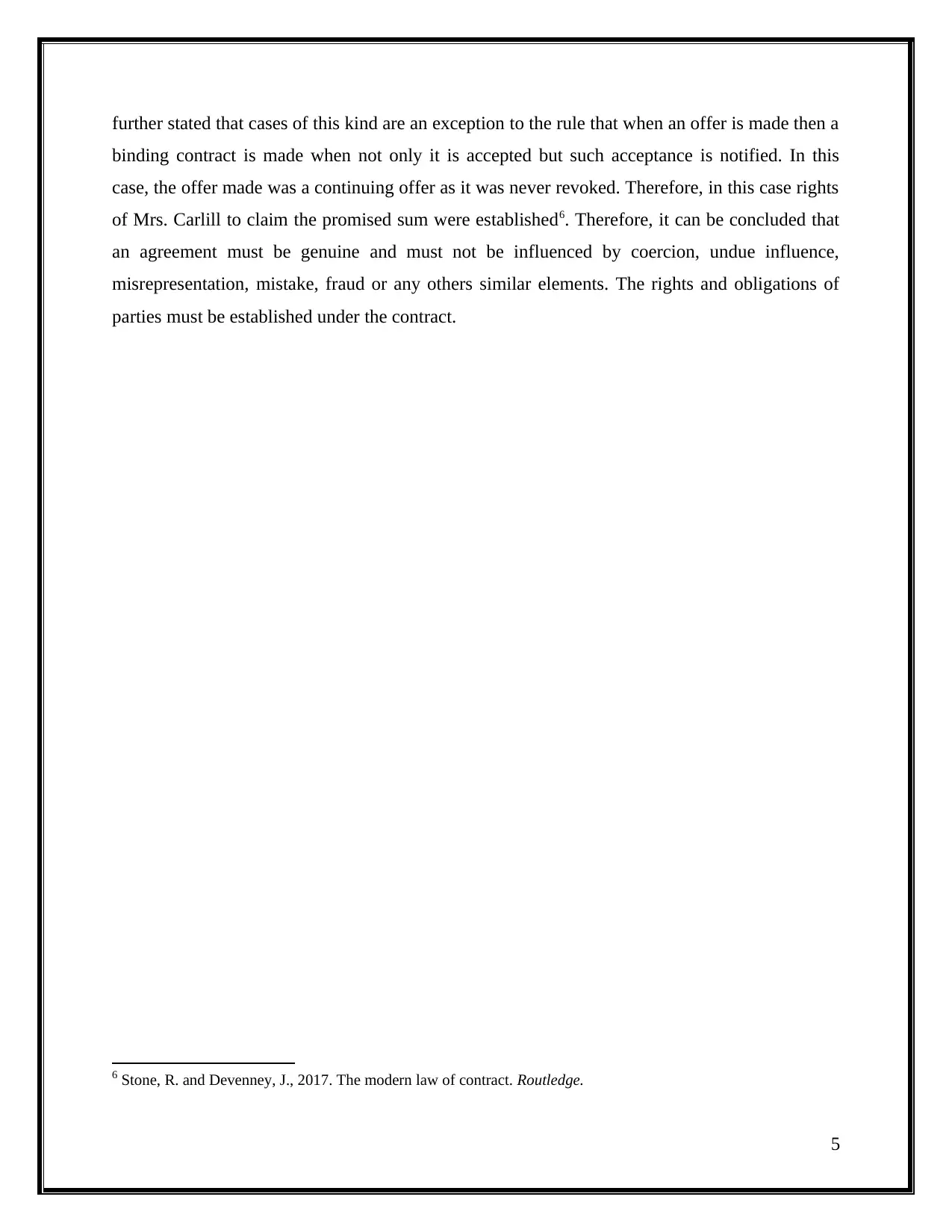
further stated that cases of this kind are an exception to the rule that when an offer is made then a
binding contract is made when not only it is accepted but such acceptance is notified. In this
case, the offer made was a continuing offer as it was never revoked. Therefore, in this case rights
of Mrs. Carlill to claim the promised sum were established6. Therefore, it can be concluded that
an agreement must be genuine and must not be influenced by coercion, undue influence,
misrepresentation, mistake, fraud or any others similar elements. The rights and obligations of
parties must be established under the contract.
6 Stone, R. and Devenney, J., 2017. The modern law of contract. Routledge.
5
binding contract is made when not only it is accepted but such acceptance is notified. In this
case, the offer made was a continuing offer as it was never revoked. Therefore, in this case rights
of Mrs. Carlill to claim the promised sum were established6. Therefore, it can be concluded that
an agreement must be genuine and must not be influenced by coercion, undue influence,
misrepresentation, mistake, fraud or any others similar elements. The rights and obligations of
parties must be established under the contract.
6 Stone, R. and Devenney, J., 2017. The modern law of contract. Routledge.
5
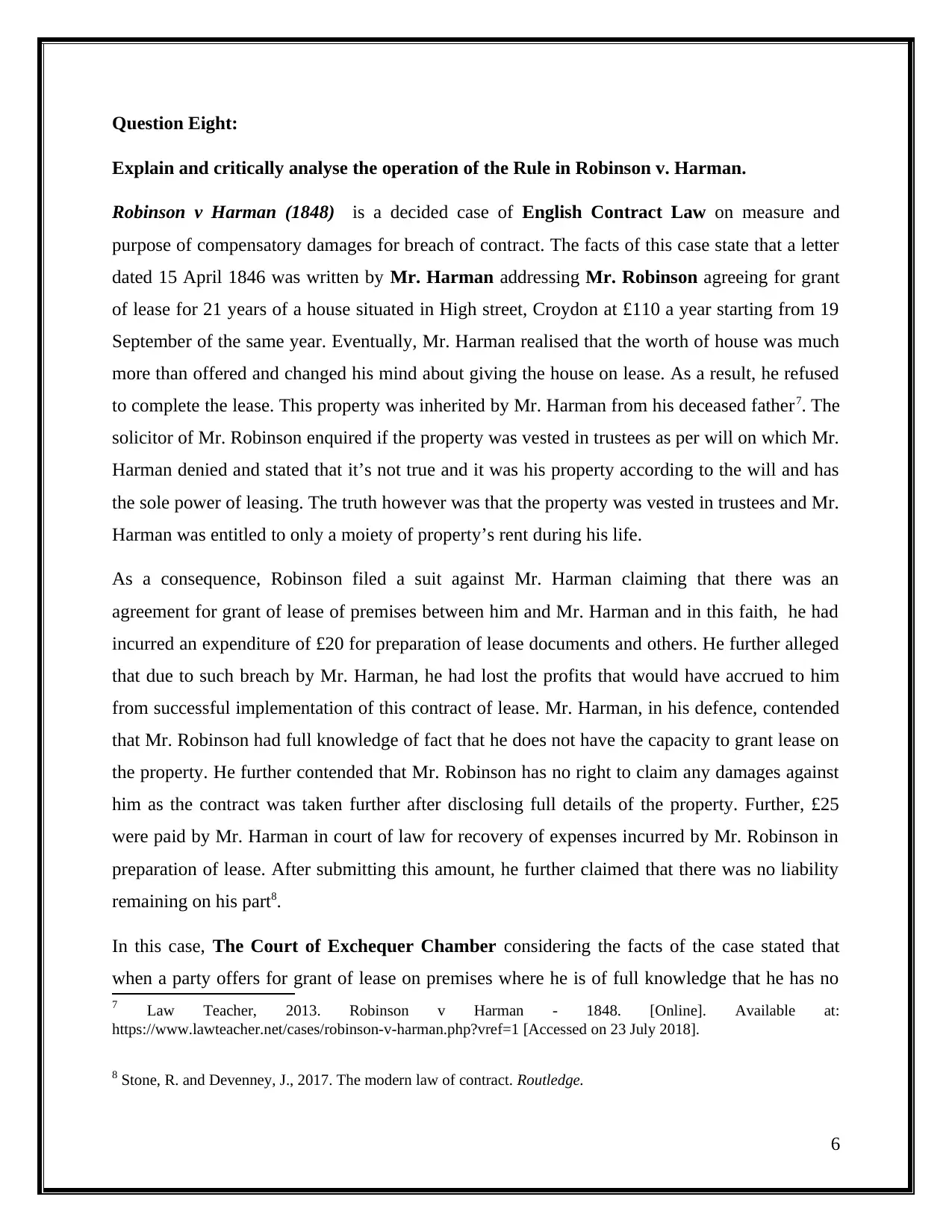
Question Eight:
Explain and critically analyse the operation of the Rule in Robinson v. Harman.
Robinson v Harman (1848) is a decided case of English Contract Law on measure and
purpose of compensatory damages for breach of contract. The facts of this case state that a letter
dated 15 April 1846 was written by Mr. Harman addressing Mr. Robinson agreeing for grant
of lease for 21 years of a house situated in High street, Croydon at £110 a year starting from 19
September of the same year. Eventually, Mr. Harman realised that the worth of house was much
more than offered and changed his mind about giving the house on lease. As a result, he refused
to complete the lease. This property was inherited by Mr. Harman from his deceased father7. The
solicitor of Mr. Robinson enquired if the property was vested in trustees as per will on which Mr.
Harman denied and stated that it’s not true and it was his property according to the will and has
the sole power of leasing. The truth however was that the property was vested in trustees and Mr.
Harman was entitled to only a moiety of property’s rent during his life.
As a consequence, Robinson filed a suit against Mr. Harman claiming that there was an
agreement for grant of lease of premises between him and Mr. Harman and in this faith, he had
incurred an expenditure of £20 for preparation of lease documents and others. He further alleged
that due to such breach by Mr. Harman, he had lost the profits that would have accrued to him
from successful implementation of this contract of lease. Mr. Harman, in his defence, contended
that Mr. Robinson had full knowledge of fact that he does not have the capacity to grant lease on
the property. He further contended that Mr. Robinson has no right to claim any damages against
him as the contract was taken further after disclosing full details of the property. Further, £25
were paid by Mr. Harman in court of law for recovery of expenses incurred by Mr. Robinson in
preparation of lease. After submitting this amount, he further claimed that there was no liability
remaining on his part8.
In this case, The Court of Exchequer Chamber considering the facts of the case stated that
when a party offers for grant of lease on premises where he is of full knowledge that he has no
7 Law Teacher, 2013. Robinson v Harman - 1848. [Online]. Available at:
https://www.lawteacher.net/cases/robinson-v-harman.php?vref=1 [Accessed on 23 July 2018].
8 Stone, R. and Devenney, J., 2017. The modern law of contract. Routledge.
6
Explain and critically analyse the operation of the Rule in Robinson v. Harman.
Robinson v Harman (1848) is a decided case of English Contract Law on measure and
purpose of compensatory damages for breach of contract. The facts of this case state that a letter
dated 15 April 1846 was written by Mr. Harman addressing Mr. Robinson agreeing for grant
of lease for 21 years of a house situated in High street, Croydon at £110 a year starting from 19
September of the same year. Eventually, Mr. Harman realised that the worth of house was much
more than offered and changed his mind about giving the house on lease. As a result, he refused
to complete the lease. This property was inherited by Mr. Harman from his deceased father7. The
solicitor of Mr. Robinson enquired if the property was vested in trustees as per will on which Mr.
Harman denied and stated that it’s not true and it was his property according to the will and has
the sole power of leasing. The truth however was that the property was vested in trustees and Mr.
Harman was entitled to only a moiety of property’s rent during his life.
As a consequence, Robinson filed a suit against Mr. Harman claiming that there was an
agreement for grant of lease of premises between him and Mr. Harman and in this faith, he had
incurred an expenditure of £20 for preparation of lease documents and others. He further alleged
that due to such breach by Mr. Harman, he had lost the profits that would have accrued to him
from successful implementation of this contract of lease. Mr. Harman, in his defence, contended
that Mr. Robinson had full knowledge of fact that he does not have the capacity to grant lease on
the property. He further contended that Mr. Robinson has no right to claim any damages against
him as the contract was taken further after disclosing full details of the property. Further, £25
were paid by Mr. Harman in court of law for recovery of expenses incurred by Mr. Robinson in
preparation of lease. After submitting this amount, he further claimed that there was no liability
remaining on his part8.
In this case, The Court of Exchequer Chamber considering the facts of the case stated that
when a party offers for grant of lease on premises where he is of full knowledge that he has no
7 Law Teacher, 2013. Robinson v Harman - 1848. [Online]. Available at:
https://www.lawteacher.net/cases/robinson-v-harman.php?vref=1 [Accessed on 23 July 2018].
8 Stone, R. and Devenney, J., 2017. The modern law of contract. Routledge.
6
⊘ This is a preview!⊘
Do you want full access?
Subscribe today to unlock all pages.

Trusted by 1+ million students worldwide
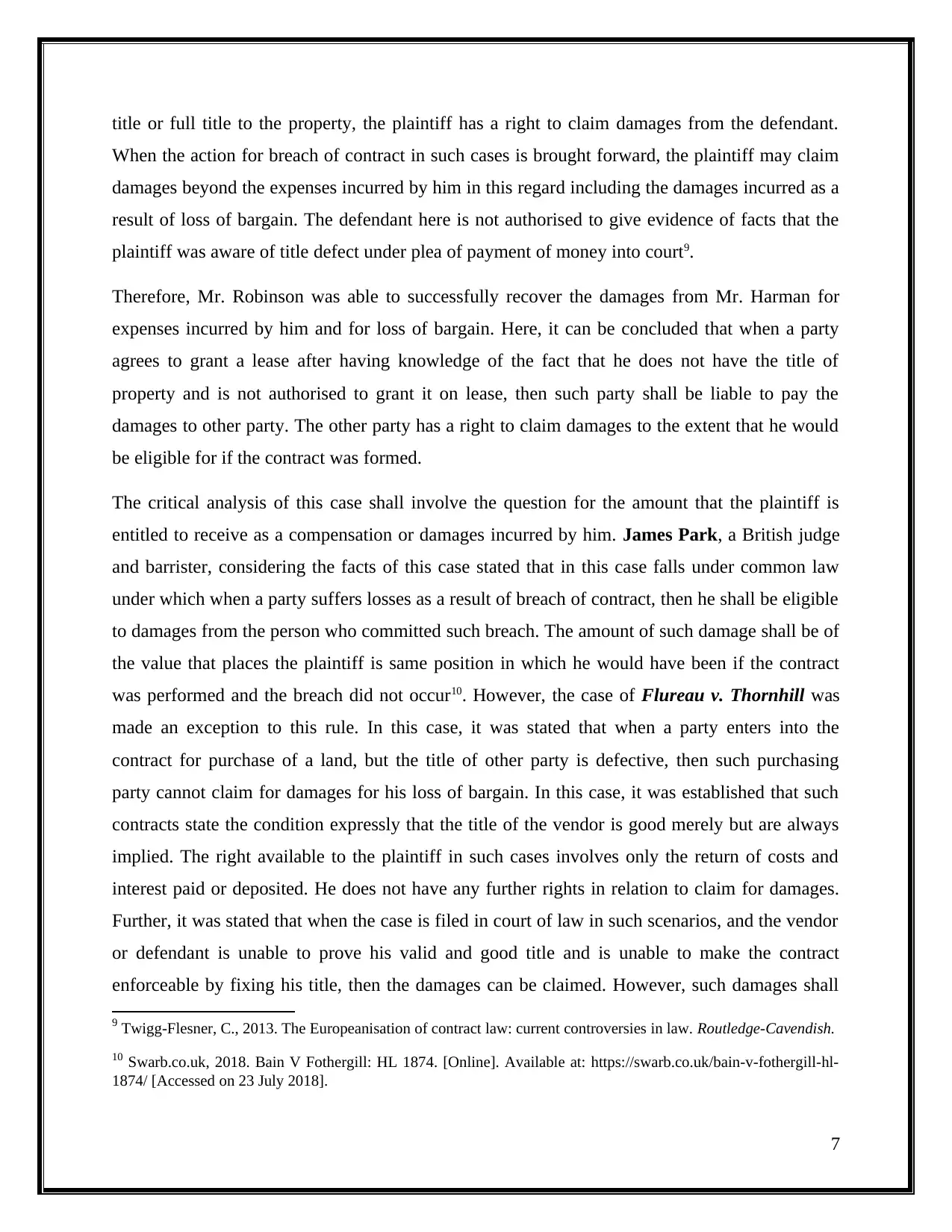
title or full title to the property, the plaintiff has a right to claim damages from the defendant.
When the action for breach of contract in such cases is brought forward, the plaintiff may claim
damages beyond the expenses incurred by him in this regard including the damages incurred as a
result of loss of bargain. The defendant here is not authorised to give evidence of facts that the
plaintiff was aware of title defect under plea of payment of money into court9.
Therefore, Mr. Robinson was able to successfully recover the damages from Mr. Harman for
expenses incurred by him and for loss of bargain. Here, it can be concluded that when a party
agrees to grant a lease after having knowledge of the fact that he does not have the title of
property and is not authorised to grant it on lease, then such party shall be liable to pay the
damages to other party. The other party has a right to claim damages to the extent that he would
be eligible for if the contract was formed.
The critical analysis of this case shall involve the question for the amount that the plaintiff is
entitled to receive as a compensation or damages incurred by him. James Park, a British judge
and barrister, considering the facts of this case stated that in this case falls under common law
under which when a party suffers losses as a result of breach of contract, then he shall be eligible
to damages from the person who committed such breach. The amount of such damage shall be of
the value that places the plaintiff is same position in which he would have been if the contract
was performed and the breach did not occur10. However, the case of Flureau v. Thornhill was
made an exception to this rule. In this case, it was stated that when a party enters into the
contract for purchase of a land, but the title of other party is defective, then such purchasing
party cannot claim for damages for his loss of bargain. In this case, it was established that such
contracts state the condition expressly that the title of the vendor is good merely but are always
implied. The right available to the plaintiff in such cases involves only the return of costs and
interest paid or deposited. He does not have any further rights in relation to claim for damages.
Further, it was stated that when the case is filed in court of law in such scenarios, and the vendor
or defendant is unable to prove his valid and good title and is unable to make the contract
enforceable by fixing his title, then the damages can be claimed. However, such damages shall
9 Twigg-Flesner, C., 2013. The Europeanisation of contract law: current controversies in law. Routledge-Cavendish.
10 Swarb.co.uk, 2018. Bain V Fothergill: HL 1874. [Online]. Available at: https://swarb.co.uk/bain-v-fothergill-hl-
1874/ [Accessed on 23 July 2018].
7
When the action for breach of contract in such cases is brought forward, the plaintiff may claim
damages beyond the expenses incurred by him in this regard including the damages incurred as a
result of loss of bargain. The defendant here is not authorised to give evidence of facts that the
plaintiff was aware of title defect under plea of payment of money into court9.
Therefore, Mr. Robinson was able to successfully recover the damages from Mr. Harman for
expenses incurred by him and for loss of bargain. Here, it can be concluded that when a party
agrees to grant a lease after having knowledge of the fact that he does not have the title of
property and is not authorised to grant it on lease, then such party shall be liable to pay the
damages to other party. The other party has a right to claim damages to the extent that he would
be eligible for if the contract was formed.
The critical analysis of this case shall involve the question for the amount that the plaintiff is
entitled to receive as a compensation or damages incurred by him. James Park, a British judge
and barrister, considering the facts of this case stated that in this case falls under common law
under which when a party suffers losses as a result of breach of contract, then he shall be eligible
to damages from the person who committed such breach. The amount of such damage shall be of
the value that places the plaintiff is same position in which he would have been if the contract
was performed and the breach did not occur10. However, the case of Flureau v. Thornhill was
made an exception to this rule. In this case, it was stated that when a party enters into the
contract for purchase of a land, but the title of other party is defective, then such purchasing
party cannot claim for damages for his loss of bargain. In this case, it was established that such
contracts state the condition expressly that the title of the vendor is good merely but are always
implied. The right available to the plaintiff in such cases involves only the return of costs and
interest paid or deposited. He does not have any further rights in relation to claim for damages.
Further, it was stated that when the case is filed in court of law in such scenarios, and the vendor
or defendant is unable to prove his valid and good title and is unable to make the contract
enforceable by fixing his title, then the damages can be claimed. However, such damages shall
9 Twigg-Flesner, C., 2013. The Europeanisation of contract law: current controversies in law. Routledge-Cavendish.
10 Swarb.co.uk, 2018. Bain V Fothergill: HL 1874. [Online]. Available at: https://swarb.co.uk/bain-v-fothergill-hl-
1874/ [Accessed on 23 July 2018].
7
Paraphrase This Document
Need a fresh take? Get an instant paraphrase of this document with our AI Paraphraser
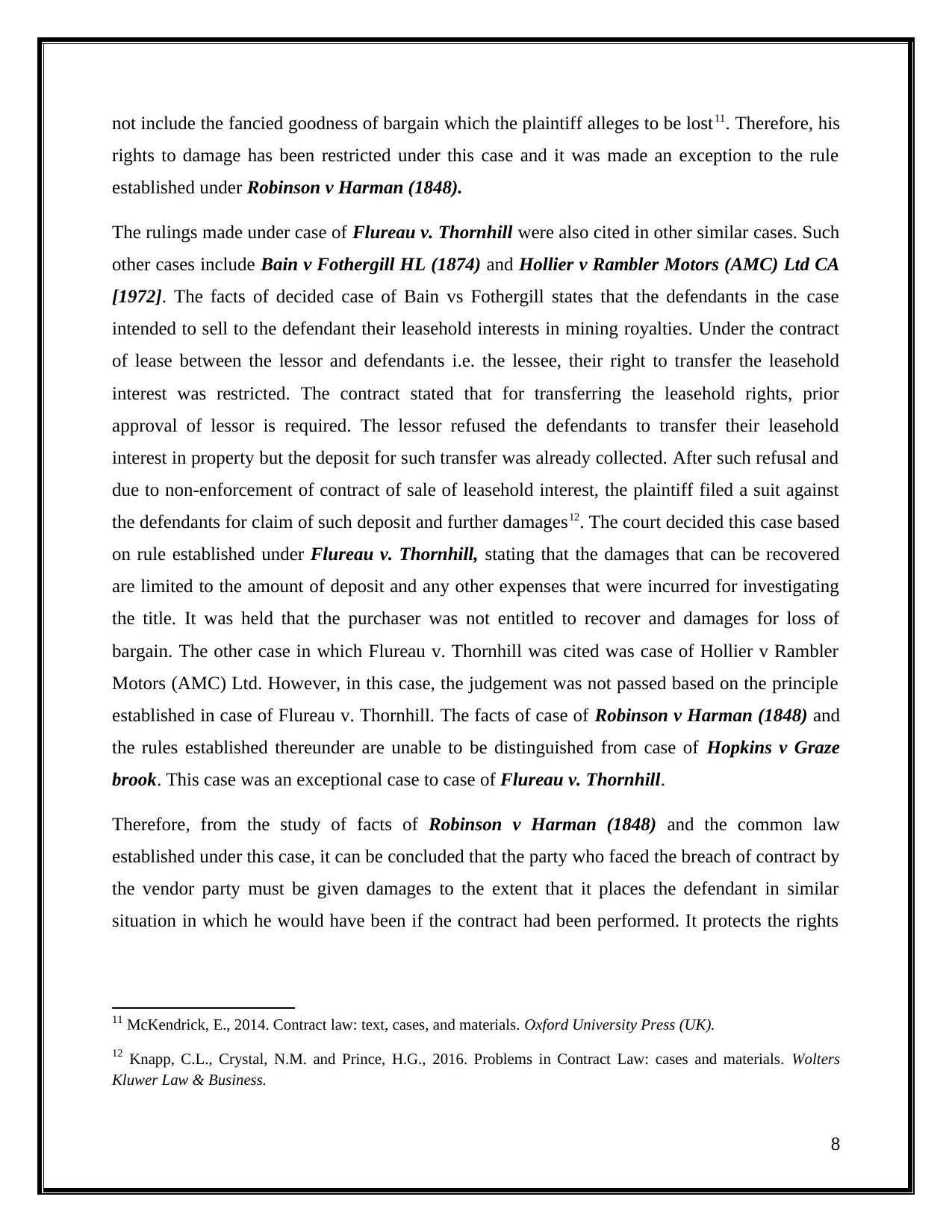
not include the fancied goodness of bargain which the plaintiff alleges to be lost11. Therefore, his
rights to damage has been restricted under this case and it was made an exception to the rule
established under Robinson v Harman (1848).
The rulings made under case of Flureau v. Thornhill were also cited in other similar cases. Such
other cases include Bain v Fothergill HL (1874) and Hollier v Rambler Motors (AMC) Ltd CA
[1972]. The facts of decided case of Bain vs Fothergill states that the defendants in the case
intended to sell to the defendant their leasehold interests in mining royalties. Under the contract
of lease between the lessor and defendants i.e. the lessee, their right to transfer the leasehold
interest was restricted. The contract stated that for transferring the leasehold rights, prior
approval of lessor is required. The lessor refused the defendants to transfer their leasehold
interest in property but the deposit for such transfer was already collected. After such refusal and
due to non-enforcement of contract of sale of leasehold interest, the plaintiff filed a suit against
the defendants for claim of such deposit and further damages12. The court decided this case based
on rule established under Flureau v. Thornhill, stating that the damages that can be recovered
are limited to the amount of deposit and any other expenses that were incurred for investigating
the title. It was held that the purchaser was not entitled to recover and damages for loss of
bargain. The other case in which Flureau v. Thornhill was cited was case of Hollier v Rambler
Motors (AMC) Ltd. However, in this case, the judgement was not passed based on the principle
established in case of Flureau v. Thornhill. The facts of case of Robinson v Harman (1848) and
the rules established thereunder are unable to be distinguished from case of Hopkins v Graze
brook. This case was an exceptional case to case of Flureau v. Thornhill.
Therefore, from the study of facts of Robinson v Harman (1848) and the common law
established under this case, it can be concluded that the party who faced the breach of contract by
the vendor party must be given damages to the extent that it places the defendant in similar
situation in which he would have been if the contract had been performed. It protects the rights
11 McKendrick, E., 2014. Contract law: text, cases, and materials. Oxford University Press (UK).
12 Knapp, C.L., Crystal, N.M. and Prince, H.G., 2016. Problems in Contract Law: cases and materials. Wolters
Kluwer Law & Business.
8
rights to damage has been restricted under this case and it was made an exception to the rule
established under Robinson v Harman (1848).
The rulings made under case of Flureau v. Thornhill were also cited in other similar cases. Such
other cases include Bain v Fothergill HL (1874) and Hollier v Rambler Motors (AMC) Ltd CA
[1972]. The facts of decided case of Bain vs Fothergill states that the defendants in the case
intended to sell to the defendant their leasehold interests in mining royalties. Under the contract
of lease between the lessor and defendants i.e. the lessee, their right to transfer the leasehold
interest was restricted. The contract stated that for transferring the leasehold rights, prior
approval of lessor is required. The lessor refused the defendants to transfer their leasehold
interest in property but the deposit for such transfer was already collected. After such refusal and
due to non-enforcement of contract of sale of leasehold interest, the plaintiff filed a suit against
the defendants for claim of such deposit and further damages12. The court decided this case based
on rule established under Flureau v. Thornhill, stating that the damages that can be recovered
are limited to the amount of deposit and any other expenses that were incurred for investigating
the title. It was held that the purchaser was not entitled to recover and damages for loss of
bargain. The other case in which Flureau v. Thornhill was cited was case of Hollier v Rambler
Motors (AMC) Ltd. However, in this case, the judgement was not passed based on the principle
established in case of Flureau v. Thornhill. The facts of case of Robinson v Harman (1848) and
the rules established thereunder are unable to be distinguished from case of Hopkins v Graze
brook. This case was an exceptional case to case of Flureau v. Thornhill.
Therefore, from the study of facts of Robinson v Harman (1848) and the common law
established under this case, it can be concluded that the party who faced the breach of contract by
the vendor party must be given damages to the extent that it places the defendant in similar
situation in which he would have been if the contract had been performed. It protects the rights
11 McKendrick, E., 2014. Contract law: text, cases, and materials. Oxford University Press (UK).
12 Knapp, C.L., Crystal, N.M. and Prince, H.G., 2016. Problems in Contract Law: cases and materials. Wolters
Kluwer Law & Business.
8
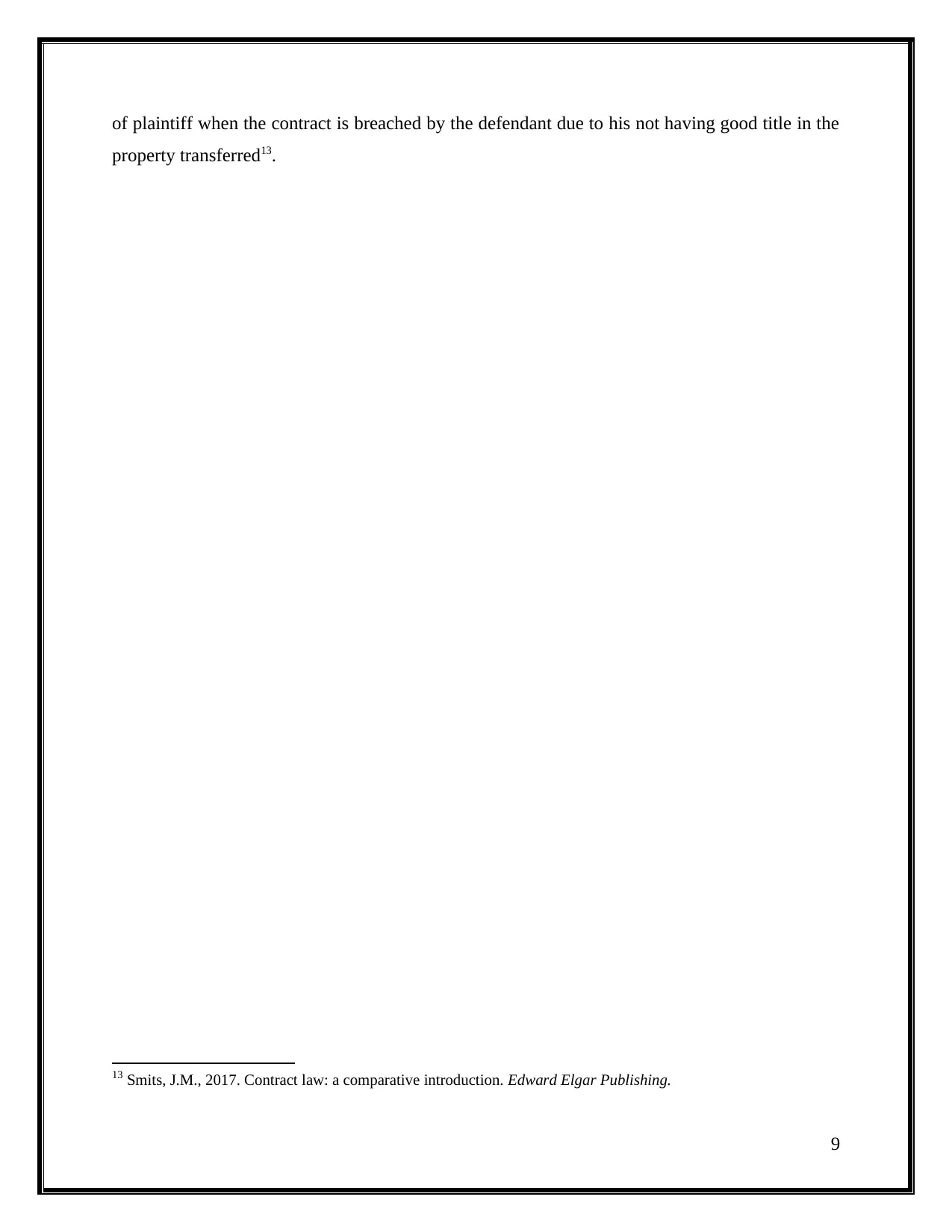
of plaintiff when the contract is breached by the defendant due to his not having good title in the
property transferred13.
13 Smits, J.M., 2017. Contract law: a comparative introduction. Edward Elgar Publishing.
9
property transferred13.
13 Smits, J.M., 2017. Contract law: a comparative introduction. Edward Elgar Publishing.
9
⊘ This is a preview!⊘
Do you want full access?
Subscribe today to unlock all pages.

Trusted by 1+ million students worldwide
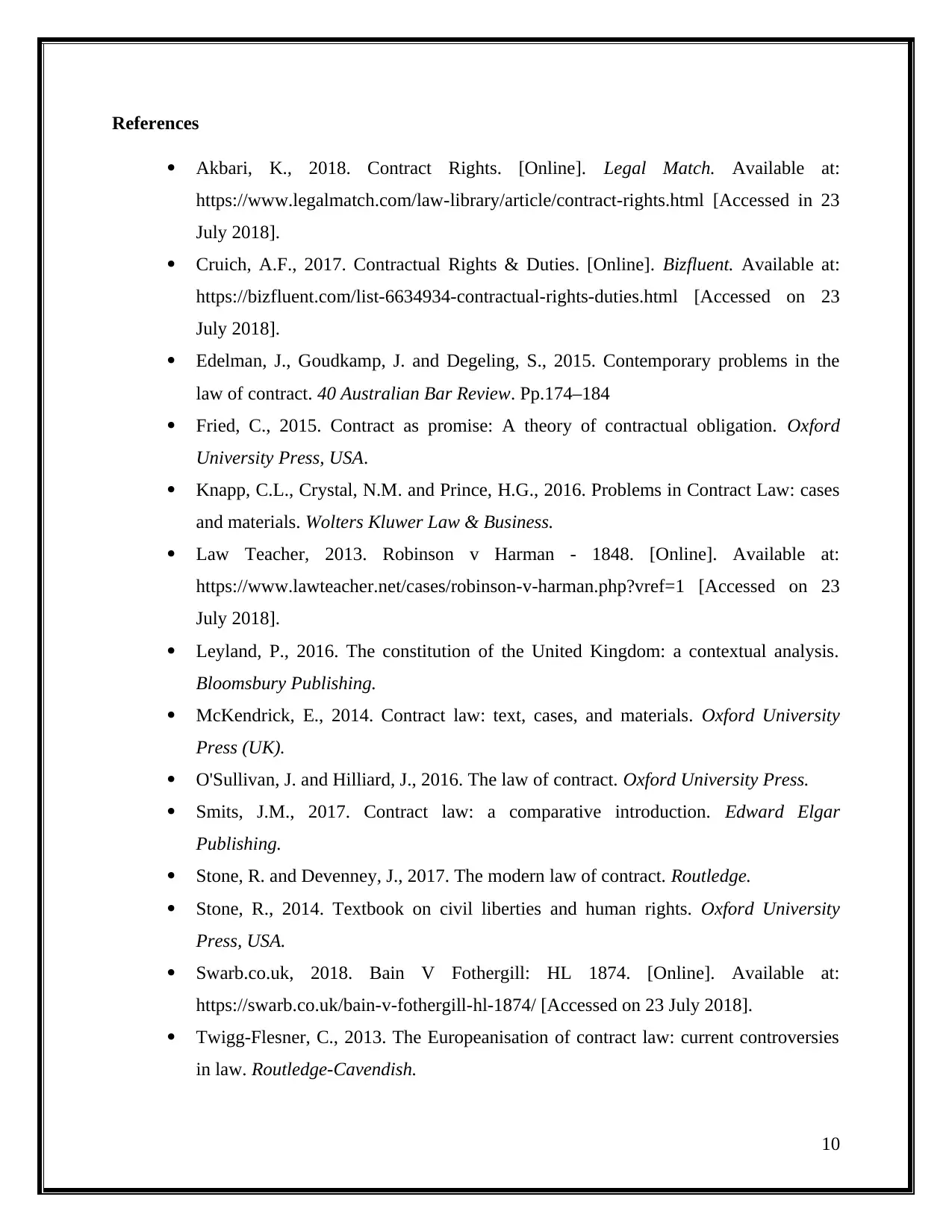
References
Akbari, K., 2018. Contract Rights. [Online]. Legal Match. Available at:
https://www.legalmatch.com/law-library/article/contract-rights.html [Accessed in 23
July 2018].
Cruich, A.F., 2017. Contractual Rights & Duties. [Online]. Bizfluent. Available at:
https://bizfluent.com/list-6634934-contractual-rights-duties.html [Accessed on 23
July 2018].
Edelman, J., Goudkamp, J. and Degeling, S., 2015. Contemporary problems in the
law of contract. 40 Australian Bar Review. Pp.174–184
Fried, C., 2015. Contract as promise: A theory of contractual obligation. Oxford
University Press, USA.
Knapp, C.L., Crystal, N.M. and Prince, H.G., 2016. Problems in Contract Law: cases
and materials. Wolters Kluwer Law & Business.
Law Teacher, 2013. Robinson v Harman - 1848. [Online]. Available at:
https://www.lawteacher.net/cases/robinson-v-harman.php?vref=1 [Accessed on 23
July 2018].
Leyland, P., 2016. The constitution of the United Kingdom: a contextual analysis.
Bloomsbury Publishing.
McKendrick, E., 2014. Contract law: text, cases, and materials. Oxford University
Press (UK).
O'Sullivan, J. and Hilliard, J., 2016. The law of contract. Oxford University Press.
Smits, J.M., 2017. Contract law: a comparative introduction. Edward Elgar
Publishing.
Stone, R. and Devenney, J., 2017. The modern law of contract. Routledge.
Stone, R., 2014. Textbook on civil liberties and human rights. Oxford University
Press, USA.
Swarb.co.uk, 2018. Bain V Fothergill: HL 1874. [Online]. Available at:
https://swarb.co.uk/bain-v-fothergill-hl-1874/ [Accessed on 23 July 2018].
Twigg-Flesner, C., 2013. The Europeanisation of contract law: current controversies
in law. Routledge-Cavendish.
10
Akbari, K., 2018. Contract Rights. [Online]. Legal Match. Available at:
https://www.legalmatch.com/law-library/article/contract-rights.html [Accessed in 23
July 2018].
Cruich, A.F., 2017. Contractual Rights & Duties. [Online]. Bizfluent. Available at:
https://bizfluent.com/list-6634934-contractual-rights-duties.html [Accessed on 23
July 2018].
Edelman, J., Goudkamp, J. and Degeling, S., 2015. Contemporary problems in the
law of contract. 40 Australian Bar Review. Pp.174–184
Fried, C., 2015. Contract as promise: A theory of contractual obligation. Oxford
University Press, USA.
Knapp, C.L., Crystal, N.M. and Prince, H.G., 2016. Problems in Contract Law: cases
and materials. Wolters Kluwer Law & Business.
Law Teacher, 2013. Robinson v Harman - 1848. [Online]. Available at:
https://www.lawteacher.net/cases/robinson-v-harman.php?vref=1 [Accessed on 23
July 2018].
Leyland, P., 2016. The constitution of the United Kingdom: a contextual analysis.
Bloomsbury Publishing.
McKendrick, E., 2014. Contract law: text, cases, and materials. Oxford University
Press (UK).
O'Sullivan, J. and Hilliard, J., 2016. The law of contract. Oxford University Press.
Smits, J.M., 2017. Contract law: a comparative introduction. Edward Elgar
Publishing.
Stone, R. and Devenney, J., 2017. The modern law of contract. Routledge.
Stone, R., 2014. Textbook on civil liberties and human rights. Oxford University
Press, USA.
Swarb.co.uk, 2018. Bain V Fothergill: HL 1874. [Online]. Available at:
https://swarb.co.uk/bain-v-fothergill-hl-1874/ [Accessed on 23 July 2018].
Twigg-Flesner, C., 2013. The Europeanisation of contract law: current controversies
in law. Routledge-Cavendish.
10
1 out of 10
Related Documents
Your All-in-One AI-Powered Toolkit for Academic Success.
+13062052269
info@desklib.com
Available 24*7 on WhatsApp / Email
![[object Object]](/_next/static/media/star-bottom.7253800d.svg)
Unlock your academic potential
Copyright © 2020–2026 A2Z Services. All Rights Reserved. Developed and managed by ZUCOL.




